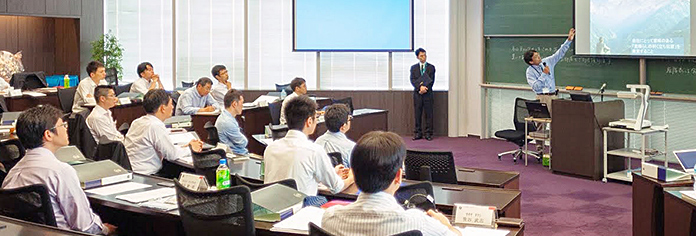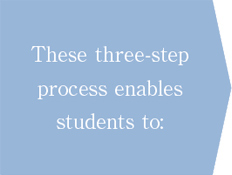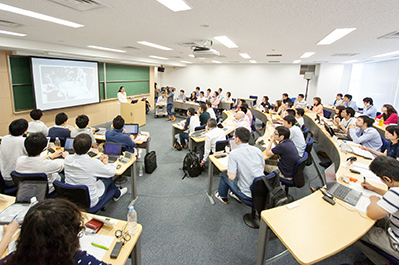
Case Method - KEIO Model
The "case method" is a unique educational approach in which students read the cases* before class, and under the leadership of professors, discuss their analyses, the key management decisions made in the case, and the reasons behind the decisions.
*Case: Study materials describing actual management issues companies and organizations have faced
Case Method Class Flow

- Clarify what the issues are and what decisions need to be made.
- Make interpretations about the explanations and materials associated with the management issues.
- Propose specific strategies to solve the issues.
- Compare and deliberate what strategies are effective, considering the issues related to the strategies and other circumstances of the business.
- Make a final judgment.
Difference between Case Method and Case Study
Case Method
The "case method" is an educational approach designed to develop practical business skills through repeated discussion and debate among students using case materials created to achieve a specific academic objective. Different from typical educational materials, the case materials describe facts (some aspects may differ from actual events), and instead of simply providing students with study topics (information and theories), the cases require students to develop their own ideas. It is a student-led academic approach.
Case Study
"Case study" is a way to study articles and other materials created from research. Students study the analyses and interpretations of the authors. Study materials are based on facts (actual events) and specify the learning points of the case. The author provides interpretative materials to help students understand the cases, and students are taught the case in a passive manner.
Case Method - KEIO Model
1. Developing Managerial Talent Rooted in Japan's Economic Society
- Backed by about a half century of history, the Keio model case method approach is compatible with the needs of Japanese companies.
- Students respect each other's views and collaborate to develop a viewpoint contributing to management.
- Classes are highly collaborative and cooperative, raising the educational effectiveness through a learning community.
2. Robust Case Development
- KBS develops 100 original cases a year to continually refresh the curriculum.
- Students discuss cases on Japanese companies from a broad range of industries.
- There is a large portfolio of case materials from overseas business schools translated into Japanese.
3. Classes Led by Faculty with Distinguished Research Background
- Professors leading the MBA and Ph.D. programs discuss their latest research outcomes in classes.
- Cases reflect the academic rigor of a research university.
- Cases reflect the insights of professors with strong relations with Japanese companies.
Studying under the case method
- Students developskills for practical management decision-makingwhich cannot be attained from the one-way lecturing of general information and theory.
- Students develop the ability to systematically apply insights across different business fields.
- Students developrobust leadership skills and a sense of management missionby combining practical skills with theory.


